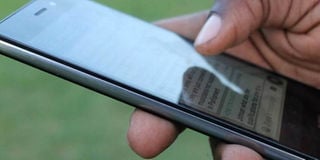Prime
Why Nakasero SS allows smart phones in class

Mr Godfrey Mubiru, the school director of studies said they took the decision to allow the learners to use smartphones to facilitate the implementation of the new lower secondary school curriculum.
What you need to know:
- Mr Godfrey Mubiru, the school director of studies said they took the decision to allow the learners to use smartphones to facilitate the implementation of the new lower secondary school curriculum
Senior one and two students at Nakasero Senior School in Kampala are now free to carry their smartphones to their classes following clearance from the management.
Mr Godfrey Mubiru, the school director of studies said they took the decision to allow the learners to use smartphones to facilitate the implementation of the new lower secondary school curriculum.
Mr Mubiru explained that they found it important as a school to allow the learners to use smartphones due to the demands of the new curriculum which is hands-on and more learners centred.
According to him, the new curriculum requires the learners to carry out their own research and write notes. The teacher's role ends at introducing the topic and helping the learners to form groups to research and share knowledge among themselves.
He also explained that smartphones have since helped them to overcome the challenge of limited learners’ guides for the new curriculum as every student can now download the material using their smartphones for effective learning.
“We've made a very perfect programme at Nakasero. We're letting students come with phones because we looked at this as the best way every student can have the learners' guide for effectiveness. They also need to make research since they are the ones to make their own notes. We are using the phones, the computer lab and the library. However, for more effectiveness, we came to realise the phones are better. That's why we're letting them in class,” he said.
Currently, Uganda lacks an approved ICT policy on education, which would have set standards for the formal education sector.
However, Mubiru explains that the school came up with its own regulations on how the learners are expected to use the phones in school well knowing that they can easily lead to disruptions of the learners' attention.
The learners deposit the phones in the DOS's office with clear identification immediately they report to school. According to Mubiru, the learners only use the phones during class time under the supervision of the subject teacher.
Godwine Nuwagaba, a senior one student said it was not easy to convince his parents to buy him a smartphone for learning purposes.
“They gave in after realizing that the school would be in charge of the phones during school hours,” he said.
However, apart from the challenge of data, he said they find it easy to research on the different topics assigned to them.
Ester Namayanja, another student said despite the fact that she owned a smartphone prior to the school clearance, she never imagined using it at school.
Previously, carrying a mobile phone to school would be punishable and in some schools lead to expulsion. However, last year, the ministry of education and sports allowed student teachers to carry phones.
Dr Jane Egau, the Director of Teacher Training and Education noted that this is a sensitive area, adding that the ministry had already embarked on the process of working on a national framework that will guide the integration of digital learning.
READ MORE




